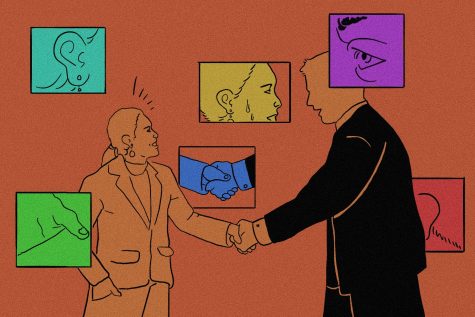Opinion: Work places need better outreach, accommodations for autistic workers
May 3, 2023

DEI ISSUE
Diversity, equity and inclusion: this phrase is now echoing throughout the workforce in training presentations, many of which are talking about race, religion, sexual orientation and gender identity. But never do I see anything about the importance of including neurodiversity in the workplace.
While I have only cycled through three jobs in my life, I always notice a similarity: I am the only autistic person that I know of in that space, and there are no accommodations for neurodiverse employees.
This is not surprising to me. Roughly 21% of people with a disability were employed in 2022, according to the United States Department of Labor. In comparison, in the same year, 65.4% of people without a disability were employed. That is about one in five disabled people employed, and autism is only one group under that category.
Though we all don’t want to admit it, many employers have internalized ableism that prevents autistic people from wanting to work. Many workforces don’t campaign or try to recruit more individuals with autism, whether that is because accommodating employees can be seen as a nuisance or because workplaces just don’t want to give us a chance at all.
Ableism is defined as discrimination in favor of able-bodied — or able-minded — people. Ableist individuals portray those who are being defined by their disabilities as inherently inferior to able-bodied people. This can include lack of compliance with disability rights laws, using harmful language to describe yourself or others such as “psycho” or “spaz” and not including disability resources in DEI strategies in the workforce.
Those who may get into the workforce — like myself — are limited with resources to help us navigate a neurotypical world. A world that includes verbal and nonverbal social cues, knowing automatically why someone may be upset or how they’re feeling and having to make constant eye contact with superiors and colleagues.
Throughout my time in the working world, I find myself having to mask — a common term used with those with autism in which neurodiverse people hide their authentic selves in an effort to gain greater social acceptance.
It is exhausting; it makes it difficult to constantly socialize with my coworkers, and when I don’t, I’m deemed rude or sad. In reality, I don’t have resources such as designated quiet spaces nor clear and concise directions on how to correctly perform my job. Instead, I have a gray area of unspoken rules and tasks I am supposed to “just know” or be expected to do without instruction. This might be easy and normal for neurotypical workers, but it makes working as an autistic person ten times harder.
As I begin my departure from college and ease my way into the working world, I find it difficult to find a workplace that caters to the needs of autistic individuals. Though many job openings on LinkedIn claim that they do not discriminate based on disability, with that one-in-five statistic, I have serious concerns and doubts about the ability of a workplace to be inclusive to neurodivergent workers.
Autism should never be a deterrent for workplaces currently hiring employees, and autistic individuals should never have to mask as a means of getting hired.
Workers that have autism have been “found to have fewer absences, are more likely to arrive at work on time, are more reliable and have dramatically lower turnover rates than neurotypical employees,” according to a published excerpt from the book “Generation A: Research on Autism in the Workplace.”
Despite needing more support from their employers, neurodiverse individuals bring in a lot of skills that show unique viewpoints.
Extra resources should not be viewed as an extra expense, but as a necessity for a thriving workplace. Not only do resources such as a designated, sensory-friendly room help autistic employees step away and calm down when work can become overstimulating, but many neurotypical employees can benefit from them too as a way to step out of a stressful environment and take time to calm down. Less stress means an overall healthier work environment.
Claiming your office space cannot obtain the resources that meet the needs of autistic people and that you cannot hire autistic employees is ableist.
Furthermore, in order to be accommodating to those with autism, many steps need to be taken.
Keeping disability disclosement consensual must be clearly addressed. As someone who has experienced coworkers revealing my personal disability to others, I know this is a problem.
As a working person with autism, I would also like to see DEI training implemented into the workplace, as well as a clear process for requesting resources that should be readily available. Training should actually be included in the workplace and ideally should look like providing specific rules to employees, which include avoidance of certain language and abstaining from infantilizing autistic employees, as this is offensive and minimizes our humanity.
Furthermore, working alongside organizations that specialize in inclusive employment, like Spectrum Designs Foundation, is just as imperative, allowing autistic employees to raise their voices if their needs are not being met.
Prioritizing the needs of autistic voices is essential because it truly reflects the goals of a workplace wanting to reflect DEI strategies, as well as creates total inclusivity for everyone. Autistic employees bring just as much skill and talent to the workforce as any other worker.
Including autistic people in the workplace is a key factor in inclusivity for everyone. DEI discussions are important, and it’s equally important to include neurodiverse voices in these discussions because we, too, matter and deserve to have a seat at the table.







